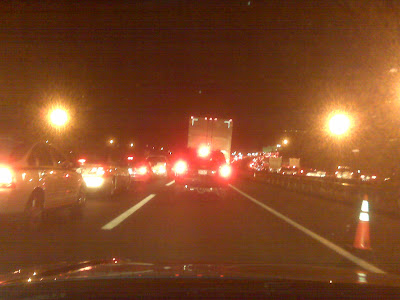Thanksgiving weekend is one of the most (if not the one) busiest travel weekend in the year in the United States. This is the main lesson I learned during the first Thanksgiving ever I spent in this country.
Together with my friend MR we drove from Providence to Philadelphia Wednesday night, before thanksgiving began. We hardly found any traffic in our way down there, and we made very good time: around 5 hours. We supposed that if we drive back on Sunday afternoon, we would make at least 10 hours because of the traffic. So Saturday was the best option. Since I wanted to get in time to catch the last train from Providence to Boston at 10pm we decided to leave around 3:30pm.
Everything was fine during the first hour. We went through New Jersey, and even made a stop to grab something to eat. However, after that stop, there was a huge traffic jam waiting for us around New York City. The traffic was because of the George Washington Bridge Toll.
The toll costs $8. This is very costly for a toll. Of course, the high price should be correlated with the incentive the authorities want to create to reduce traffic in that area. That is the main idea of the expensive tolls to get into Manhattan as well.
However, they can do much better. We spent almost two hours in traffic. Two hours. I would have pay more than $8 to skip the traffic. I guess that the vast majority of the people on the road were willing to do the same. My friend told me (even before I talked about the cost of time in economic models) that his hourly wage is much more than the cost of the toll, and that he was willing to pay more to skip the traffic - even $50!
People's time cost money - either for unemployed people (say, the minimum wage). And this is the main variable that makes people decide between many factors that have to do with time: such as the decision between labor and leisure, or fertility decisions (children cost time and money).
So, the toll system there was totally inefficient - mainly because of two reasons:
1) People were willing to pay more than $8 to avoid the traffic.
2) The excess of carbon dioxide that the cars in the traffic were emitting could have been minimized in the absence of that toll, minimizing as well the costs of the externalities of pollution.
Now, how can this be done? Israel has an interesting system of tolls in Itzhak Rabin Highway (Highway 6). There are cameras located at the entrances and exits to the highway which take pictures of the license plate of your car. Then the pictures are processed and they send you the bill by mail with the cost depending on how long was your ride in the highway, what kind of car you have (sedan or truck) and how many individuals were inside the car. The cost can be around $10 for one ride in average.
People decide to go into the highway depending on factors such as how much time they will save (the highway crosses Israel in a straight line, as opposed to other highways), the price of gasoline (you may save gasoline by using that highway), and of course the traffic.
As opposed to Highway 6 in Israel, in the George Washington Birdge toll you have to pay not only cash, but with your wasted time as well, instead of having a more intelligent system. It is a shame that the State of NY could have triplicated the money they did in tolls during this weekend if they would have send bills by mail asking for even $15.
Think about the time you spend in traffic, and how much money will you be willing to pay not to be in traffic during your whole lifetime. I assure you that your answer will depend on your (expected) hourly wage multiplied by the amount of time you expect to be in traffic. I guess that in a city such as Caracas, people would pay thousands of dollars for assuring themselves a traffic-free city. This money could be used to create more efficient roads, and probably people would be better-off... But yes, I know, this is a crazy idea.
By the way, I didn't catch the last train on time, and I spent the night in Providence. We should have gone back the day after.
Subscribe to:
Post Comments (Atom)




Another good post, homo economicus...I just want to say two things to contribute to your readers:
ReplyDeleteYour main point, if I understand correctly, is that there should be programs that permit people to pay MORE and get through traffic quicker. There are, however, programs that allow people to pay LESS...and get through traffic quicker. E-Z Pass (in NY, NJ, PA)..Sunpass in Florida, among others. There is a time incentive and an economic incentive (not to mention an environmental incentive since)
Another new program, recently implemented in Florida, does precisely what you describe. The 95 Express Program provides 2 lanes over a 7 mile, highly congested are of the freeway, where motorists are guaranteed an average speed of at least 50 MPH. To use these lanes, drivers can either pay a toll (which varies depending on traffic), buy and register a hybrid vehicle, or register a 3+ person carpool. While the details of this program are worth discussing (there are certain incentives to cheat) in general this does what you describe...while also encouraging people to carpool more or buy more eco-friendly cars.
Your thoughts?